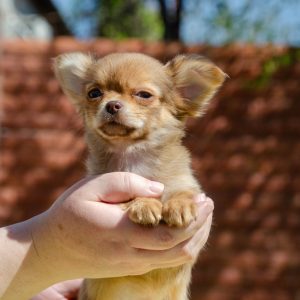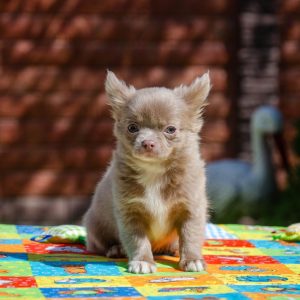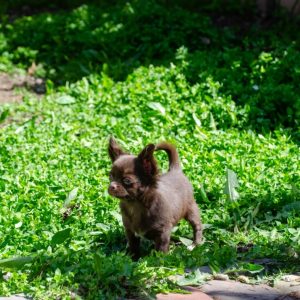
Chihuahua
The Chihuahua breed is considered to be the smallest pedigree dog in the world. The Chihuahua can be best described as affectionate, lively and courageous. Chihuahuas are also hard headed and can be difficult to manage if their owner is not good at asserting authority. These dogs get extremely attached to their owner, very often choosing a particular person in the house, shadowing the individual constantly and becoming increasingly suspicious of strangers.
Chihuahua breed attributes
About Chihuahua breed
Description
The Chihuahua is considered to be the smallest pedigree dog in the world. Chihuahuas have a characteristic apple shaped head with large, upright, pointy ears and a short muzzle that meets the skull at a sharp angle. A slightly upturned nose sits on the end of the muzzle, and a pair of large, expressive, round eyes are placed on opposite sides of a broad, rounded forehead. The mouth of the Chihuahua is rimmed by thin, tight fitting lips. The occlusion of the teeth and structure of the mandibles give rise to either a scissor bite or pincer bite.
The head is connected to a compact, well-built body by means of a slightly arched neck. The neck is usually thicker in males than in females, and should be covered by tight fitting skin. The presence of a mane is highly desirable in the long haired variety. The short back of a Chihuahua is straight throughout, ending in strongly muscled, broad hindquarters. The chest of a Chihuahua is both broad and deep, reaching down to the elbows but must never look barrel shaped.
The dog’s moderately long tail is set high on the dog’s hindquarters, and is carried high and in a curve or semicircle with the tip of the tail pointing at the dog’s loins. When at rest the tail is left hanging downward ending in a slight hook. The dog’s front limbs fall straight under to dogs body, while its muscular hind legs show moderate angulation at the hips, knees, and hocks never loosing harmony with the dog’s fore quarters.
Origin: Mexico
Look
Smooth-haired Chihuahuas have a very low maintenance, short coat that lies flat against their body. The hair is usually shorter on the face and ears while slightly longer on the neck and tail. The hair is also a bit sparse around the belly and throat. The Chihuahua’s soft, shiny coat can at times have an undercoat.
On the other hand long-haired Chihuahuas have longer silky coats that might need some taking care of. The coat might either be straight or have a slight wave and the undercoat must never be too thick. The longer parts of the coat form feathering on the dog’s ears, neck, tail and back of the legs. Daily brushing and an occasional visit to the groomer will keep the dog’s coat in good shape.
All coat colours are accepted except for merle. The Chihuahua is a moderate shedder.
Health
The Chihuahua breed is considered to be a long lived breed. However, there are a number of conditions that are associated with this breed. These are:
- Luxating patella.
- Dental disease.
- Corneal dryness.
- Secondary glaucoma.
- Excessive weight gain.
- Caesarean section.
- Granulomatous Meningoencephalitis.
It is recommended that young dogs visit a veterinarian to get their knees examined in order to determine if they are prone to patellar luxation. Special care should be taken in order to properly manage a Chihuahua’s oral hygiene to avoid future health problems. It is suggested for Chihuahuas to be taken for a yearly check-up. This makes sure that some of the above conditions are caught at an early stage and prevent them from worsening through proper management and treatment.
At Newdoggy.com we promote puppies coming from reputable breeders, who use genetic testing and good breeding practices to remove genetic conditions from their breeding lines. Newdoggy.com’s Health Guarantee certifies that all promoted puppies are in good health.
Learning
It is suggested for Chihuahua to avoid over indulging these dogs since this very often leads to Small Dog Syndrome. Small Dog Syndrome is a sure fire way for the dog to assume control over different aspects of your life leading to a very unsatisfactory relationship with your dog.
The Chihuahua is a very intelligent dog that can learn very quickly. Chihuahuas are notorious for having a very strong will, defying anyone but the best of leaders. It is imperative to always use firm, positive reinforcement, allowing your dog to trust you. In order to thwart eventual behavioural problems, Chihuahuas should never be treated any differently than big dogs.
It would be ideal to start teaching a Chihuahua some basic commands as early as possible. House breaking could be difficult but perseverance is key. Chihuahuas also benefit a lot from obedience classes when of the right age. People that lead a busy lifestyle should consider acclimatizing these dogs to some hours of solitude in order to avoid separation anxiety issues when they have to stay alone.
Temperament
The Chihuahua breed can be best described as affectionate, lively and courageous.
Chihuahuas are also hard headed and can be difficult to manage if their owner is not good at asserting authority. These dogs get extremely attached to their owner, very often choosing a particular person in the house, shadowing the individual constantly and becoming increasingly suspicious of strangers. Due to this breed’s predisposition to jealousy, it is not suggested for these dogs to be housed with other dogs and small children. Doing so might result in the child getting bitten, or a violent altercation with other dogs resulting in the Chihuahua getting seriously injured. Well socialized and adequately trained Chihuahuas should not have these problems. Well balanced individuals should have no problem peacefully cohabiting with other animals and people.
Living with
Chihuahuas usually adapt to apartment life very easily. They would also do well in a house with an adequately sized garden but it is still required to take your Chihuahua for a daily walk. When your dog is outside be aware that birds of prey and other wild animals could seriously harm these dogs.
Find Chihuahua Puppies for Sale
New litter alert
Please fill in the below form and we will let you know when a new Chihuahua litter arrives.





















